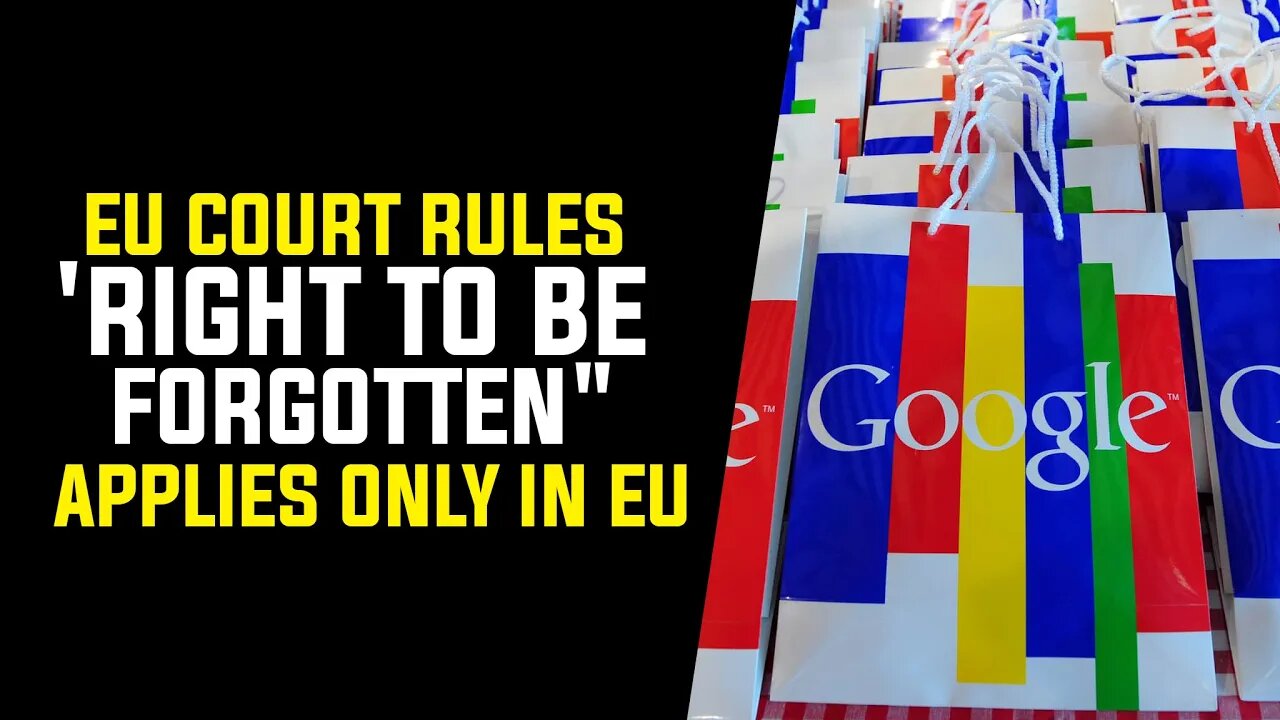Premium Only Content

EU Court Rules 'Right to be Forgotten" applies only in EU
What Google is introducing as a significant legal victory, the maximum court in the European Union -- the European Court of Justice (ECJ) -- has dominated the search engine operators like Google do not need to employ the"right to be forgotten" worldwide. While Google should still deal with any proper to become forgotten requests from EU taxpayers and take suitable actions to eliminate info from European versions of its research webpages (e.g. Google.fr or Google.de), it doesn't have to scrub such advice from its own non-EU webpages (for example, Google.com). In making the judgment, the European Court of Justice clarified that it had been trying to balance two thoughts: the right to privacy and the right.
The European Court of Justice judgment to be forgotten stems from a continuing dispute between Google and French solitude regulator CNIL. Back in 2015, the CNIL advised Google to employ some proper to be forgotten takedown requests. Afterwards, in 2016 if Google had refused to comply with this petition, the CNIL imposed a fine of over $100,000 from Google. As may be guessed, Google protested this plan of action, also sentenced to the French Council of State, which took the case to the European Court of Justice. Considering that the ECJ is the maximum court in the EU, it can be a decision on the matter in Europe.
For the previous 3 decades, Google has been marshalling its powers and constructing its own arguments in defense of its own present policy of just implementing"right to be forgotten" requests from Internet users into its European research domain names. According to Google, the best is not an absolute best, and a right. To put it differently, Google is prepared to recognize the best of the EU employ rules locally and to create guidelines for its 28 member countries. That is Google's responsibility under EU law when it would like to run within the boundaries of the EU. But, Google isn't eager to allow the EU decide policy for the remainder of the Earth, which it might do if it needed Google to manage right to be forgotten asks.
Google has tried to frame its own decision-making procedure about the right to become forgotten from Europe in the context of two rights: the right to privacy and the right to freedom of access to data. In an extreme scenario, contended Google, an authoritarian government may try to"cover up" human rights abuses or other severe offenses by simply removing scrubbing or links search success. Google saw its coverage to strike a balance between two rights.
Complicating things, clearly, is that nation-states have boundaries, although the Internet doesn't. Google's compromise alternative -- where data that was sensitive is shown by it is full of all types of issues and loopholes. By way of instance, someone working with a Virtual Private Network (VPN) can conceal their identity and geolocation in the community, and consequently access webpages which may be"hidden,""banned" or"deleted" in different countries. It is because of this, by way of instance, that China has resisted the use of VPN programs it might make it much too simple for a Chinese citizen to find access to Western media reports. In precisely the exact same manner, an EU user may use an VPN to skip Google's European search success.
Additionally, consider exactly how easy it will be for somebody in Europe to find the info that they are seeking to find by simply traveling to some place like New York City -- after they have defeated European airspace, they'd suddenly get access to info that was blocked for them. And, for that matter, what's going to happen to the UK in case it decides to proceed with a Brexit and leave the EU? Considering that the right went into effect as soon as the UK was part of the EU, could it apply into a world?
It will be intriguing to observe how countries manage the tension between the right to privacy and the right. By way of instance, inside the U.S. there was growing concern that the EU will have the ability to control the activities of a U.S. firm beyond the EU's borders, and it's probable that, if Google's attraction had failed with the European Court of Justice, it may have turned into backers inside the U.S. government for assistance. That would have put into motion an expected legal showdown involving the U.S and Europe which have had implications for U.S.-EU trade arrangements or U.S.-EU diplomatic connections.
Round the world, the balance between liberty and privacy right of speech changes. For the time being Google could walk off with a success as it does not have any obligation under EU legislation to produce the proper to be forgotten that a right.
\
-
 16:41
16:41
UncivilLaw
1 year agoTake Care of Maya - Summary of Dec. 15 hearing (stream excerpt)
2K -
 2:16:48
2:16:48
Tundra Tactical
10 hours ago $0.11 earned🎯💥 The World’s Okayest Gun Show 🔫😂 | LIVE Tonight on Rumble!
31.3K1 -
 3:36:03
3:36:03
Mally_Mouse
1 day ago🌶️ 🥵Spicy BITE Saturday!! 🥵🌶️- Let's Play: Tower Unite!
57.1K2 -
 58:59
58:59
MattMorseTV
10 hours ago $1.61 earned🔴Trump just BROKE Newsom.🔴
73.1K85 -
 18:14
18:14
Her Patriot Voice
10 hours agoWho Is WORSE for NYC: Trump Girl or Socialist?
55K34 -
 3:39:42
3:39:42
SavageJayGatsby
10 hours agoSpicy Saturday with Mally! | Road to 100 | $300 Weekly Goal for Spicy Bites!
51.7K1 -
 3:35:50
3:35:50
FomoTV
11 hours ago🚨 Swamp Theater: FBI Raids Bolton 🕵 Still NO Epstein Files, Trump's Troops & the Red Heifer Hoax 🐂 | Fomocast 08.23.25
23.9K7 -
 6:04:40
6:04:40
Akademiks
15 hours agoRoc Nation & Meg Thee Stallion did a 7 HOUR Deposition with me. Drake Secret Kid Finally Revealed.
60K3 -
 24:19
24:19
Stephen Gardner
11 hours ago🚨BREAKING: FBI Raid of John Bolton’s House Reveals THIS!
62.1K146 -
 8:31
8:31
MattMorseTV
13 hours ago $1.22 earnedTexas just did the IMPOSSIBLE.
52K69